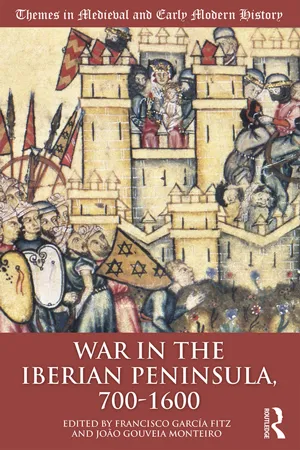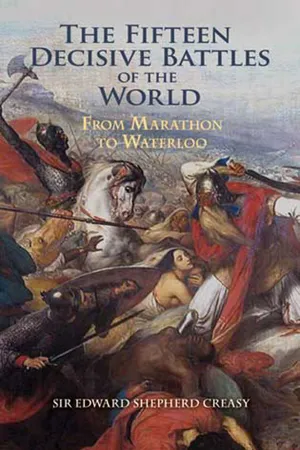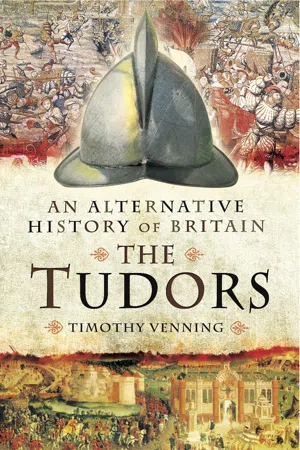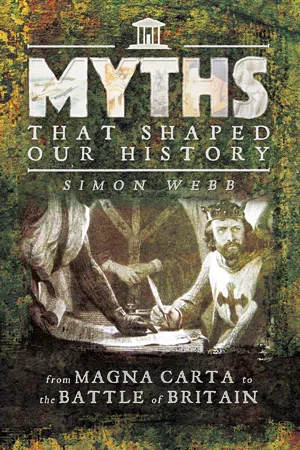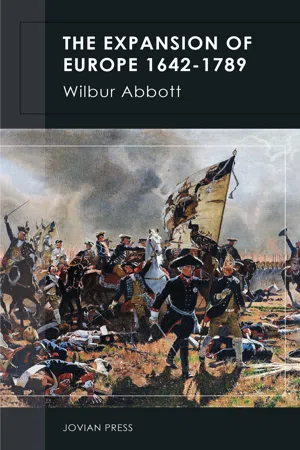Anglo Spanish War
The Anglo-Spanish War was a series of conflicts between England and Spain that occurred from 1585 to 1604. The war was primarily fought over control of the seas and trade routes, as well as religious differences between Protestant England and Catholic Spain. The most famous event of the war was the Spanish Armada's failed invasion of England in 1588.
6 Key excerpts on "Anglo Spanish War"
- eBook - ePub
- Francisco García Fitz, João Gouveia Monteiro, Francisco García Fitz, João Gouveia Monteiro(Authors)
- 2018(Publication Date)
- Routledge(Publisher)
...She was thus attempting to support the rebel cause at its weakest moment, at the same time as ensuring that the Spaniards would have to continue fighting on this front. The war against England was predominantly naval and colonial. The English repeatedly attacked the Spanish coasts (Vigo 1585, Corunna and Lisbon 1589, Cadiz 1587 and 1596 and Las Palmas, in Gran Canaria, 1595), and above all the Spanish empire in America, through the actions of Francis Drake (Nombre de Dios 1572, Panama, El Callao and Lima 1577 and Valparaíso 1578). These were attacks which on repeated occasions enjoyed their expected success, especially in America, and led to the sacking of the aforementioned cities, which gave rise to a new defensive policy on the part of Spain. The Spanish Armada in 1588, which was intended to invade England, was a tremendous failure, and the Spanish fleet was defeated, as most of the ships sank as a result of bad weather, more than as a consequence of the actions of the English ships. FIGURE 7.2 Siege of Grave 1586, by Frans Hogenberg, 1588. (Rijksmuseum, Amsterdam) The preparations for the invasion of England, and the Spanish participation in the French religious wars, from 1590 onwards, had hindered the operations of the army of Flanders, which enabled the Dutch to recover from the critical situation in which they had found themselves and to rally after their territorial losses. This front would be left on hold, with the Dutch taking the initiative, while the Spanish troops concentrated on the fight in France. In 1595, Henri IV declared war on Spain, and for the next three years, until the Peace of Vervins (1598), the conflict would have a fundamental effect on the frontiers of the Netherlands, the Franche-Comté and Savoy...
- eBook - ePub
The Fifteen Decisive Battles of the World
From Marathon to Waterloo
- Edward Shepherd Creasy(Author)
- 2012(Publication Date)
- Dover Publications(Publisher)
...Of which the number of soldiers, the fearful burthen of their ships, the commanders’ names of every squadron, with all others, their magazines of provision were put in print, as an army and navy irresistible and disdaining prevention: with all which their great and terrible ostentation, they did not in all their sailing round about England so much as sink or take one ship, bark, pinnace, or cockboat of ours, or even burn so much as one sheepcote on this land.” SYNOPSIS OF EVENTS BETWEEN THE DEFEAT OF THE SPANISH ARMADA, A.D. 1588; AND THE BATTLE OF BLENHEIM, A.D. 1704. A.D. 1594. Henry IV of France conforms to the Roman Catholic Church, and ends the civil wars that had long desolated France. 1598. Philip II of Spain dies, leaving a ruined navy and an exhausted kingdom. 1603. Death of Queen Elizabeth. The Scotch dynasty of the Stuarts succeeds to the throne of England. 1619. Commencement of the Thirty Years’ War in Germany. 1624–1642. Cardinal Richelieu is minister of France. He breaks the power of the nobility, reduces the Huguenots to complete subjection; and by aiding the Protestant German princes in the latter part of the Thirty Years’ War, he humiliates France’s ancient rival, Austria. 1630. Gustavus Adolphus, King of Sweden, marches into Germany to the assistance of the Protestants, who were nearly crushed by the Austrian armies. He gains several great victories, and, after his death, Sweden, under his statesmen and generals, continues to take a leading part in the war. 1640. Portugal throws off the Spanish yoke: and the House of Braganza begins to reign. 1642. Commencement of the civil war in England between Charles I and his parliament. 1648. The Thirty Years’ War in Germany ended by the treaty of Westphalia. 1653. Oliver Cromwell lord-protector of England. 1660. Restoration of the Stuarts to the English throne. 1661. Louis XIV takes the administration of affairs in France into his own hands. 1667–1668...
- A. T. Mahan(Author)
- 2012(Publication Date)
- Dover Publications(Publisher)
...CHAPTER VII. WAR BETWEEN GREAT BRITAIN AND SPAIN, 1739. — WAR OF THE AUSTRIAN SUCCESSION, 1740. — FRANCE JOINS SPAIN AGAINST GREAT BRITAIN, 1744. — SEA BATTLES OF MATTHEWS, ANSON, AND HAWKE. — PEACE OF AIX-LA-CHAPELLE, 1748. W E have now reached the opening of a series of great wars, destined to last with short intervals of peace for nearly half a century, and having, amid many misleading details, one broad characteristic distinguishing them from previous, and from many subsequent, wars. This strife embraced the four quarters of the world, and that not only as side issues here and there, the main struggle being in Europe; for the great questions to be determined by it, concerning the world’s history, were the dominion of the sea and the control of distant countries, the possession of colonies, and, dependent upon these, the increase of wealth. Singularly enough it is not till nearly the end of the long contest that great fleets are found engaging, and the struggle transferred to its proper field, the sea. The action of sea power is evident enough, the issue plainly indicated from the beginning ; but for a long time there is no naval warfare of any consequence, because the truth is not recognized by the French government. The movement toward colonial extension by France is wholly popular, though illustrated by a few great names ; the attitude of the rulers is cold and mistrustful : hence came neglect of the navy, a foregone conclusion of defeat on the main question, and destruction for the time of her sea power. Such being the character of the coming wars, it is important to realize the relative positions of the three great powers in those quarters of the world, outside of Europe, where the strife was to engage. In North America, England now held the thirteen colonies, the original United States, from Maine to Georgia...
- eBook - ePub
The Tudors
An Alternative History of Britain
- Timothy Venning(Author)
- 2014(Publication Date)
- Pen & Sword Military(Publisher)
...Chapter Eight 1588: a close-run thing? The Spanish Armada – could it have landed successfully, and what then? Elizabeth and 1588: myth and reality The clash between Elizabethan England, bastion of Protestantism, and the current Catholic ‘super-power’ Spain in 1588 came to define Elizabeth’s reign and role in popular memory for centuries. It was as much the defining moment of sixteenth-century English history as 1940 was of the twentieth century, as England stood alone against a brutal and malign tyranny intent on the conquest of Europe. Elizabeth I was portrayed in the national myth, recycled in the literary and artistic media and in school textbooks, as the ultimate symbol of sturdy and defiant English patriotism. Her famous speech to her troops at Tilbury as they awaited the Armada – ‘I may have the body of a weak and feeble woman but I have the heart and stomach of a king, and a king of England too’ 1 – came to assume the iconic status later accorded to Winston Churchill and his most famous Parliamentary speech in June 1940 – ‘we shall fight them on the beaches’. The successful defeat of the might of the European Catholic ‘super-power’ and its massive fleet was enshrined as the culmination of a heroic and inevitable struggle between the Protestant ‘Gloriana’ and her doughty ‘sea-dogs’, such as Sir Francis Drake, on the one hand and the repressive and implicitly (or explicitly) Satanic Catholic would-be invaders on the other. Victory against this menace – a power as notorious for its authoritarianism and atrocities as the Nazis – was England’s just reward, due on moral grounds as much as military. The religious element of the confrontation helped to build a determinist picture of the crisis in the accounts of it presented by writers in the following decades, a picture broadly being recycled as late as the Victorian and Edwardian eras...
- eBook - ePub
Myths That Shaped Our History
From Magna Carta to the Battle of Britain
- Simon Webb(Author)
- 2017(Publication Date)
- Pen & Sword History(Publisher)
...These were both examples of God intervening in human affairs and showing whose side he was on. Myth of this sort helps us to select salient facts and see patterns in the past. This explains in part why we talk of 1588 as being the year of ‘the Spanish Armada’ and not ‘a Spanish Armada’ or ‘the first Spanish Armada’. The Armada of 1588 was dealt with so neatly, by a combination of British pluck and divine aid, that it would spoil the narrative were we to realize that there were actually a succession of the things over the course of a decade or so. Besides, those later Armadas didn’t feature the larger-than-life figure of Francis Drake, the famous hero who was the first man to circumnavigate the world. Those other Armadas would just muddle everything up. More than that, looking at later incidents in the war with Spain might make us question the idea that our brave sailors were always on hand to protect Britain during the Elizabethan Era and prevent enemies landing on our shores. This is probably why we tend to gloss over historical incidents such as the Battle of Cornwall, which took place in 1595: they do not fit in with our image of indomitable Tudor England, a country not to be trifled with. We have a vague idea that there was no successful foreign invasion of English soil after the Norman Conquest, but of course this is not really true. On 2 August 1595 four Spanish galleys arrived off the coast of Cornwall. They were the Nuestra Señora de Begona, Salvador, Peregrina and Bazana and on board were three companies of men armed with matchlock muskets, about 400 soldiers in total. Since the days of the first Spanish Armada, England was supposed to be ready for any attack from hostile ships, but the militia in the region of Mount’s Bay fled at the sight of the heavily-armed Spanish troops. Before landing their forces, the galleys bombarded Penzance with their cannons, destroying hundreds of homes. After the Spaniards landed, they spent two days burning and looting...
- eBook - ePub
- Wilbur Abbott(Author)
- 2017(Publication Date)
- Jovian Press(Publisher)
...THE WAR OF THE SPANISH SUCCESSION AND THE REORGANIZATION OF EUROPE. 1700-1720.................. IT HAS BEEN OBSERVED THAT many of the apparent differences which seem to distinguish the tendencies of successive periods of history are due less to real divergence of aims than to changes in modes of expression. What to one generation is known as religious is not infrequently called political by another, and perhaps social by a third. But even if that were true the very changes in terminology indicate a certain shifting of the prevailing temper of men which accompanies or foreshadows a real alteration of spirit or purpose. Beginning with the period of the Thirty Years’ War the conspicuous feature of the political development of continental Europe had been the rise of France and Sweden to the dominance of the European system. Between them they had prevented the establishment of the Hapsburg Empire as a real political unit. France completed the work begun by England and Holland in breaking the power of Spain. Sweden and the north German Protestants had limited Austrian influence to southeastern Europe. Their activities aided the English and the Dutch who had destroyed the monopoly of Spain and Portugal beyond the sea and in many quarters replaced it with their own ascendancy. Moreover, during the seventeenth century, even before the Thirty Years’ War came to an end, the words Catholic and Protestant had begun to lose much of their force in politics. By the middle of the reign of Louis XIV there were still apparent in European affairs the feverish ambitions of princes and peoples which tended inevitably toward the recurrence of universal war. But those ambitions were no longer religious in name or fact; they were national and above all dynastic; and they were conditioned by the results of the changes which had taken place during the preceding century. Those changes were far-reaching and profound...
